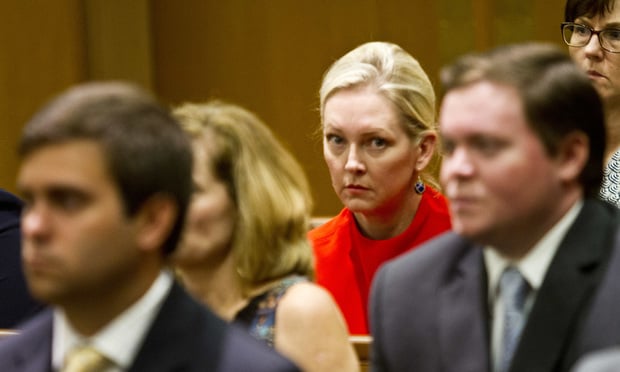Appeals Court Revives Part of Danielle Rollins' Legal-Mal Suit Against Divorce Lawyers
After she was awarded more than $15.3 million in a 2013 divorce settlement, Danielle Rollins sued her former lawyers claiming she could have gotten a better deal.
November 06, 2019 at 05:44 PM
7 minute read
 Danielle Rollins (Photo: John Disney/ALM)
Danielle Rollins (Photo: John Disney/ALM)
The Georgia Court of Appeals revived a slice of socialite and author Danielle Rollins' legal-malpractice lawsuit against the lawyers who handled her divorce from former Orkin Pest Control CEO Glen Rollins, which ended with a 2013 settlement awarding her more than $15.3 million.
The appellate ruling said that, while most of the claims tossed out by a trial judge were properly dismissed, her lawyers might have been negligent in overlooking more than $166,000 she was supposed to have been credited as part of the settlement.
As detailed in court filings, in 2015 Danielle Rollins sued her former lawyers—Alvah Smith and his firm, Levine Smith Snider & Wilson, and Barry McGough and his firm, Warner Bates & McGough (now known just as Warner Bates)—for legal malpractice and breach of contract.
Among her allegations were that her lawyers had pressured her to settle for $15.3 million, even though that was only 40% of a joint bank account. She also argued that they had failed to include the value of other holdings and stocks before telling her the settlement was the best offer she would get and that, unless she accepted, she would be forced into mediation.
The defendants filed motions for summary judgment, and following oral arguments Fulton County State Court Judge Myra Dixon asked the defense lawyers to prepare an order granting the motions and notified Rollins' lawyer about her pending ruling.
Two days later, Rollins' lawyer, Corbett Firm principal Chris Corbett, filed a motion to voluntarily dismiss the case.
The defense lawyers—Carlock Copeland & Stair partner Joe Kingma for Levine Smith and Bill Mitchell of Cruser, Mitchell, Novitz, Sanchez, Gaston & Zimet and Robyn Webb of Hoffer & Webb for Warner Bates—filed a motion to strike the dismissal.
Their motion argued that, under Georgia law, "plaintiffs may not dismiss their cases after they receive knowledge of an adverse ruling, even if the ruling has not been reduced to writing and filed on the case's docket."
Dixon struck the dismissal and granted the motions for summary judgment, ruling that Rollins' claims failed, because she could not show she could have gotten a better settlement or at trial but for her lawyers' purported negligence and that her acceptance of the settlement agreement meant she could not establish proximate cause for any alleged injury.
On appeal, Rollins challenged both the striking of her motion to dismiss and Dixon's summary judgment ruling.
On Oct. 30 a Court of Appeals ruling written by Judge Amanda Mercier with the concurrence of Presiding Judge Anne Elizabeth Barnes and Judge E. Trenton Brown III partly reversed Dixon's ruling.
After first declaring that Rollins' motion to dismiss was clearly not permitted, the opinion said she had claimed four ways her lawyers had harmed her case: by failing to advise her of the potential tax consequences of agreeing to the settlement; by failing to endure an "equitable distribution of the marital assets," failing to make Glen Rollins pay for her legal fees and failing to ensure that she was credited with $166,567 from a joint bank used to pay her husband's lawyers during the litigation.
The appellate opinion said the evidence showed that Rollins had been informed that she would be exposed to substantial tax liability and had even expressed concern that she "seem[ed] to have huge tax consequences."
"We agree with the trial court's conclusion that Rollins made an independent, well-informed and deliberate decision to accept the assets with the attendant tax consequences," the opinion said.
As to the equitable distribution of assets issue, the opinion said Rollins had read and understood the settlement and that an "equitable" distribution does not necessarily mean an equal distribution.
"Notably," it said, "there was evidence that the ex-husband was unwilling to settle for a higher amount and that some of the assets at issue would not have been subject to equitable distributions."
Regarding her legal expenses, Rollins "asserts that a fact issue exists as to whether the ex-husband should have been required to pay the legal fees she incurred in the divorce case" and "points to expert testimony that, given the circumstances of the divorce, she should not have been required to pay her own legal fees."
But that decision was one "within the sound discretion of the trial court," and Rollins "cannot show that but for the law defendants' alleged error in this regard, the outcome of the divorce action would have been different," it said.
But the $166,567 Dixon had ordered credited to Rollins as part of the final settlement was never included, the opinion said.
The defendants "had a duty to exercise a reasonable degree of skill and care, and to act with reasonable diligence and promptness in representing their client," it said.
"There is evidence that the law defendants failed to exercise such care when they neglected to make sure that a separate stipulation was executed so that Rollins would receive the attorney fee credit as the court ordered."
"There is also evidence that but for the law defendants' error in this regard, the outcome of the case would have been different," Mercier wrote. "Specifically, given the court's temporary order, Rollins could have negotiated a better outcome absent that error—namely, an outcome that included a credit for the $166,567 attorney fee payment. There being evidence of proximate cause, the law defendants were not entitled to judgment as a matter of law on that part of Rollins's legal malpractice claim."
Rollins' attorney Corbett did not respond to requests for comment on the ruling, nor did defense attorney Mitchell. Webb said she could not comment.
Kingma noted that only a small portion of Rollins' claimed damages, which he said topped $5 million, had survived the Court of Appeals.
"I'm confident that if this does go to trial and a jury see's what happened, they'll recognize that Al Smith is a great lawyer and that he did a great job for his client," said Kingma.
The litigation between Danielle and Glen Rollins did not end with the 2013 settlement.
Glen Rollins later sought and was awarded hundreds of thousands of dollars in damages and attorney fees related to claims his ex-wife removed or damaged tens of thousands of dollars worth of furnishings at Boxwood, the Buckhead mansion the couple once shared, before she moved out and relinquished the home to him as stipulated in the settlement.
Glen Rollins is also back in court now on an unrelated case. On Monday, trial began in Fulton Superior Court over claims that he and three other grandchildren of deceased Rollins patriarch O. Wayne Rollins have been denied millions of dollars they are due from a series of family trusts overseen by their uncle and father.
This content has been archived. It is available through our partners, LexisNexis® and Bloomberg Law.
To view this content, please continue to their sites.
Not a Lexis Subscriber?
Subscribe Now
Not a Bloomberg Law Subscriber?
Subscribe Now
NOT FOR REPRINT
© 2025 ALM Global, LLC, All Rights Reserved. Request academic re-use from www.copyright.com. All other uses, submit a request to [email protected]. For more information visit Asset & Logo Licensing.
You Might Like
View All
After Breakaway From FisherBroyles, Pierson Ferdinand Bills $75M in First Year
5 minute read
Veteran Litigators Move From Sidley Austin to Alston & Bird's New Chicago Office
3 minute read
'Nerve-Wracking': Fires Disrupting but Not Halting Work of Distributed Firms' LA Lawyers
3 minute read
Alston & Bird Adds M&A, Private Equity Team From McDermott in New York
4 minute readTrending Stories
- 1Judge Rejects Walgreens' Contractual Dispute Against Founder's Family Member
- 2FTC Sues PepsiCo for Alleged Price Break to Big-Box Retailer, Incurs Holyoak's Wrath
- 3Greenberg Traurig Litigation Co-Chair Returning After Three Years as US Attorney
- 4DC Circuit Rejects Jan. 6 Defendants’ Claim That Pepper Spray Isn't Dangerous Weapon
- 5Quiet Retirement Meets Resounding Win: Quinn Emanuel Name Partner Kathleen Sullivan's Vimeo Victory
Who Got The Work
J. Brugh Lower of Gibbons has entered an appearance for industrial equipment supplier Devco Corporation in a pending trademark infringement lawsuit. The suit, accusing the defendant of selling knock-off Graco products, was filed Dec. 18 in New Jersey District Court by Rivkin Radler on behalf of Graco Inc. and Graco Minnesota. The case, assigned to U.S. District Judge Zahid N. Quraishi, is 3:24-cv-11294, Graco Inc. et al v. Devco Corporation.
Who Got The Work
Rebecca Maller-Stein and Kent A. Yalowitz of Arnold & Porter Kaye Scholer have entered their appearances for Hanaco Venture Capital and its executives, Lior Prosor and David Frankel, in a pending securities lawsuit. The action, filed on Dec. 24 in New York Southern District Court by Zell, Aron & Co. on behalf of Goldeneye Advisors, accuses the defendants of negligently and fraudulently managing the plaintiff's $1 million investment. The case, assigned to U.S. District Judge Vernon S. Broderick, is 1:24-cv-09918, Goldeneye Advisors, LLC v. Hanaco Venture Capital, Ltd. et al.
Who Got The Work
Attorneys from A&O Shearman has stepped in as defense counsel for Toronto-Dominion Bank and other defendants in a pending securities class action. The suit, filed Dec. 11 in New York Southern District Court by Bleichmar Fonti & Auld, accuses the defendants of concealing the bank's 'pervasive' deficiencies in regards to its compliance with the Bank Secrecy Act and the quality of its anti-money laundering controls. The case, assigned to U.S. District Judge Arun Subramanian, is 1:24-cv-09445, Gonzalez v. The Toronto-Dominion Bank et al.
Who Got The Work
Crown Castle International, a Pennsylvania company providing shared communications infrastructure, has turned to Luke D. Wolf of Gordon Rees Scully Mansukhani to fend off a pending breach-of-contract lawsuit. The court action, filed Nov. 25 in Michigan Eastern District Court by Hooper Hathaway PC on behalf of The Town Residences LLC, accuses Crown Castle of failing to transfer approximately $30,000 in utility payments from T-Mobile in breach of a roof-top lease and assignment agreement. The case, assigned to U.S. District Judge Susan K. Declercq, is 2:24-cv-13131, The Town Residences LLC v. T-Mobile US, Inc. et al.
Who Got The Work
Wilfred P. Coronato and Daniel M. Schwartz of McCarter & English have stepped in as defense counsel to Electrolux Home Products Inc. in a pending product liability lawsuit. The court action, filed Nov. 26 in New York Eastern District Court by Poulos Lopiccolo PC and Nagel Rice LLP on behalf of David Stern, alleges that the defendant's refrigerators’ drawers and shelving repeatedly break and fall apart within months after purchase. The case, assigned to U.S. District Judge Joan M. Azrack, is 2:24-cv-08204, Stern v. Electrolux Home Products, Inc.
Featured Firms
Law Offices of Gary Martin Hays & Associates, P.C.
(470) 294-1674
Law Offices of Mark E. Salomone
(857) 444-6468
Smith & Hassler
(713) 739-1250






